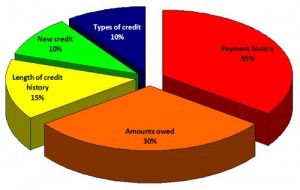Nobody has an automatic right to loans and other forms of credit. The banks and other financial institutions are not under any obligation to loan money to anyone; those that they do lend to have demonstrated that they are creditworthy and represent a low risk to their creditors.
The information that the banks use to judge whether an individual will be able to make loan repayments comes from the files held by the main credit reference agencies. From that information comes the credit score.
Having a good credit score is very important when somebody is thinking about applying for a mortgage, a loan, a credit card or a mobile phone contract. The better the score, the higher the likelihood that an application will be accepted (You can have a look here for “5 Tips to Help You Raise Your Credit Score“). Also, those with higher credit scores will benefit from better deals with lower interest rates and higher credit limits.
It is therefore important to know what information goes into calculating a credit score before applying for a credit card, a mortgage, a loan, or any other form of lending. Unbeknownst to many people, this can make a substantial difference when the time comes to think about making large purchases, like buying a house. Many people don’t realise that having a good credit score can actually make it easier to buy a mortgage. Even if it has taken a knock over the years, you could still apply for default mortgages which can help you to secure one while still taking the time to improve your current score, so you don’t have to go through this again.
The quickest way to find out what your credit score is likely to be is to apply for your credit file from one of the three main credit reference agencies: Experian, Equifax and CallCredit.
Understanding your credit information
When your file arrives, you will see that it contains a huge amount of data, detailing your financial history stretching back six years or more.
It will show:
• Your name, current address and date of birth.
• Whether you are on the electoral roll
• Your previous registered addresses and whether you were registered on the electoral roll when you lived there
• All of your bank, credit card, mortgage, loan, mobile phone and other credit accounts. This list will show when these accounts were opened as well as any credit limits, sizes of loans, monthly mobile phone bill repayments and the size of your mortgage.
• Other accounts that have been closed within the last six years. After six years, these will be removed from your credit report but if you still have a card account which you do not use, this will continue to remain on your credit report.
• Your utilisation ratio. This measures how much outstanding debt an individual has when compared with the amount of credit that that person has available to them. This is an important factor in making up a credit score and can comprise up to a third of a total credit score. People who have maxed out all of their credit cards will be shown up by this figure as this is an indication that they are experiencing financial difficulties. Lenders are looking for responsible borrowers with low utilisation ratios so you should try to keep it between 30 and 40% to maximise your chances. For example, a person with two credit cards with 5,000 limits should not have outstanding balances of more than 1,500 on each card and should not have total outstanding debt of more than 3,000.
• Your repayment history. This is displayed alongside each account and shows whether you have missed any repayment dates, how long it took for you to bring the account up to date and the number of times that this happened.
• Whether you have an overdraft, if it has been approved by your bank and the amount that you have gone overdrawn by over the last six years.
• Financial links to other people. This will only be derived through joint lending that you share with another person and will not include specific details about that individual’s financial history.
• Records from the UK’s county courts showing whether you have been made bankrupt, have County Court Judgements (CCJs) registered against you or other court rulings that are used to recover debts including attachment of earnings orders, for instance
• Details of any credit searches. Lenders search your credit report whenever you apply for a loan or any other form of credit. The agencies keep these on your credit report for up to two years. If you repeatedly apply for credit, this will be obvious from your report and may harm your chances of succeeding with an application.
• Fraud information. This is a fairly recent addition to your credit report and is used to let lenders know whether your identity has ever been used for fraudulent purposes. This information comes from CIFAS and is used to protect lenders and consumers against identity theft, identity fraud and facility takeover fraud where fraudsters use hacking techniques to take over your financial accounts.
• A credit report does not include any information about any savings, investments, ISAs or other financial information which is not related to lending. Nor does it include other personal information like whether you have a criminal record or fines that you have had to pay to the courts.
• Many utility companies are now providing Experian, Equifax and CallCredit with information about your monthly or annual utility payments if these are made by direct debit. Both British Gas and Yorkshire Water send full reports while other utilities providers supply information on missed payments or defaults. Not all utility companies do this.
• Experian started including information on tenancy agreements on its credit reports in 2013. This includes a record of monthly rental repayments, defaults and evictions.
You can read your own credit report and see which areas you need to improve to get a better credit score by applying to the reference agencies. They all charge 2 to supply you with the report and also offer a subscription service that includes credit and identity alerts and updated advice on improving your score.
Article provided by Solution Loans, a technology-led finance broker with a broad range of financial products and specialising in providing expert advice in the search for the most suitable type of credit.




